新概念英语第一册85-86课(共29张PPT)
文档属性
| 名称 | 新概念英语第一册85-86课(共29张PPT) | 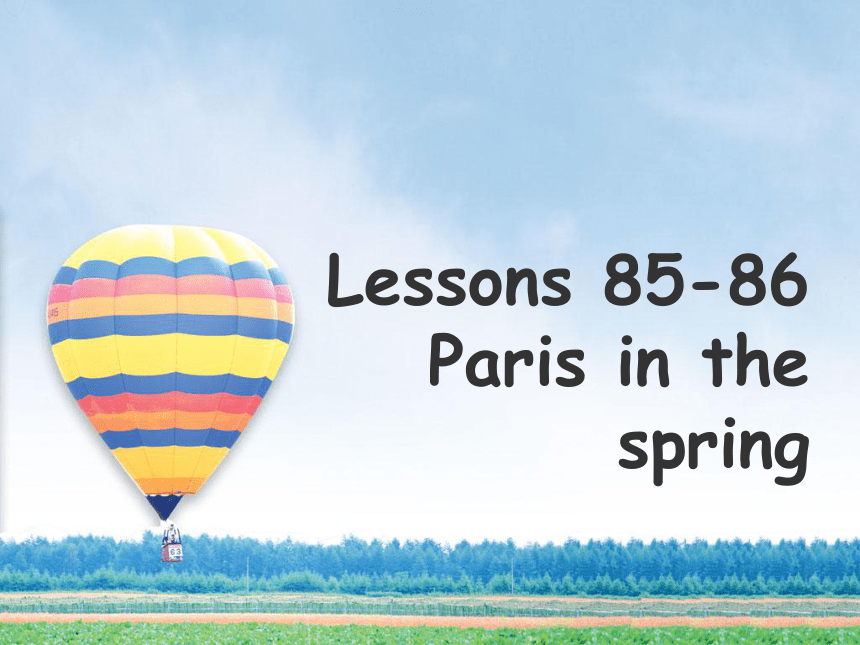 | |
| 格式 | ppt | ||
| 文件大小 | 1.8MB | ||
| 资源类型 | 教案 | ||
| 版本资源 | 新概念英语 | ||
| 科目 | 英语 | ||
| 更新时间 | 2024-01-30 10:31:30 | ||
图片预览

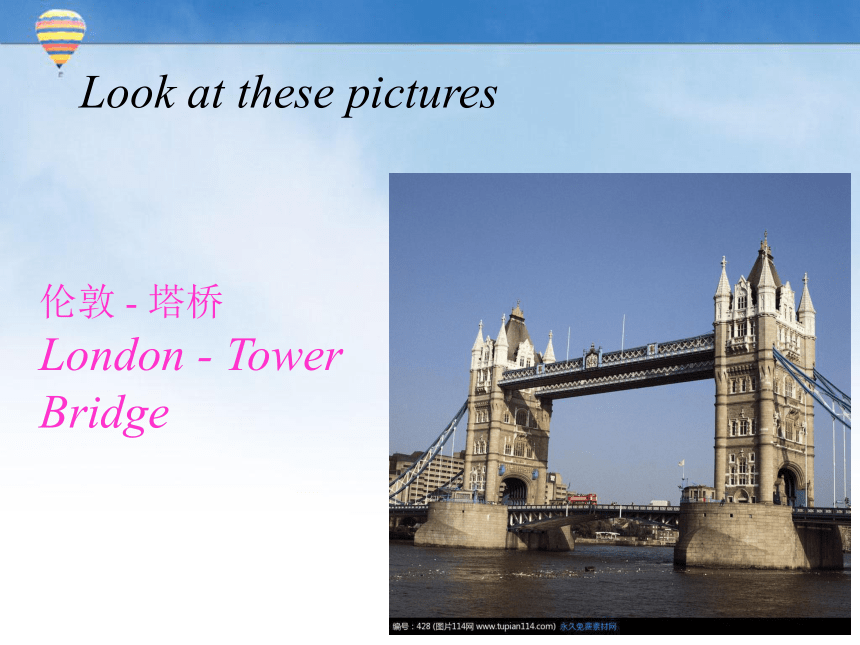


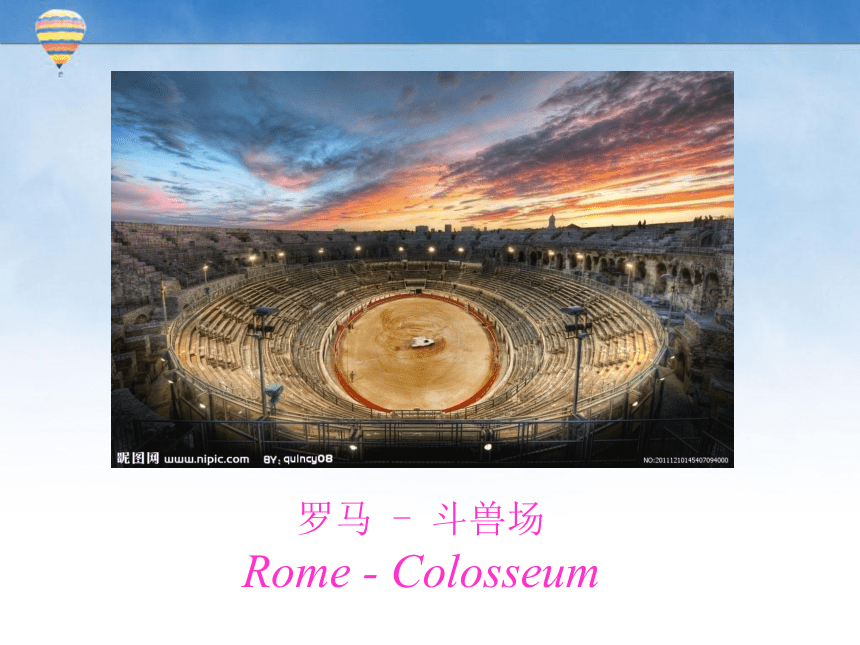
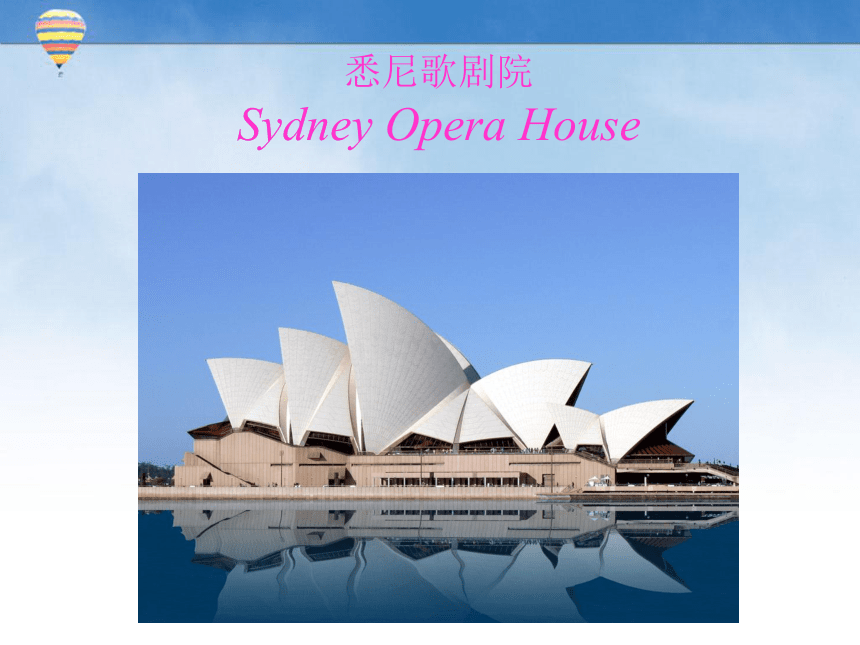
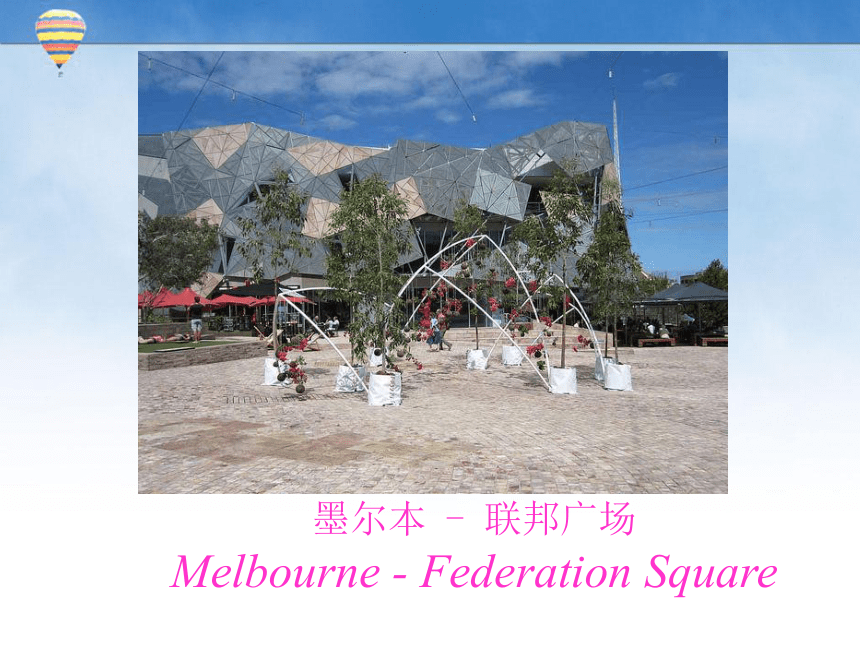

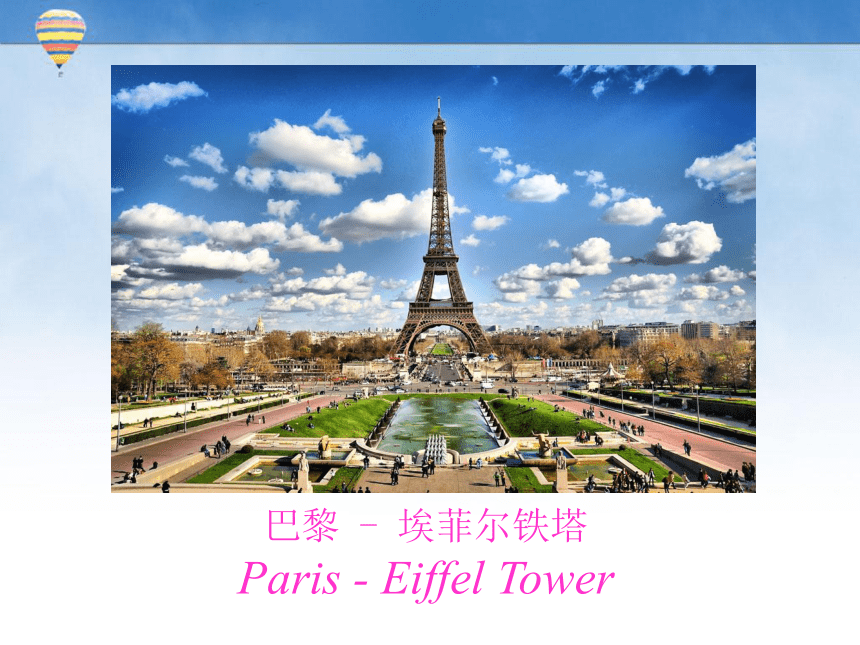
文档简介
(共29张PPT)
Lessons 85-86
Paris in the spring
Look at these pictures
伦敦 - 塔桥
London - Tower Bridge
纽约 - 时代广场
New York - Times Square
华盛顿 - 国会大厦
Washington - Capitol
罗马 - 斗兽场
Rome - Colosseum
悉尼歌剧院
Sydney Opera House
墨尔本 - 联邦广场
Melbourne - Federation Square
东京 - 富士山
Tokyo - Mount Fuji
巴黎 - 埃菲尔铁塔
Paris - Eiffel Tower
New words and expressions:
★ Paris /'p ris/ n.巴黎
Paris is the capital of France.
Paris in the spring 巴黎之春
★ cinema /'sin m / n.电影院 (英式)
movie theatre 电影院 (美式)
eg:下周我们要去看电影。
We are going to the cinema next Sunday.
★ film n.
(1)(c)n.电影
film 艺术影片(英式英语)
movie 好莱坞商业片(美式英语)
see the film
他拍了一部关于西班牙的电影。
He made a film about Spain.
(2)(u)n. 胶卷,胶片
I want a roll of film. 我想要一卷胶卷。
(3) V. 把...拍成电影
把奥运会拍成电影。
Film the Olympic Games.
我们到外国拍摄过电影。
We have filmed abroad.
★ beautiful adj. 漂亮的 adv. beautifully
beauty n. 美人,美景,美好的东西
① 美丽的,使生美感的
a beautiful girl a beautiful flower
② adj. 出色的,很棒的,完美的;令人愉悦的
多么棒的比赛呀!
What a beautiful game (it is)!
He did a beautiful job of painting the desk.
他油漆了书桌,活干得很漂亮。
fine,handsome,pretty等只表示beautiful的一部分
pretty 美丽可爱的,多用于小孩、妇女和较细小的东西,语气较弱
a pretty child
good-looking 相貌好看的,语气弱,可修饰男性或女性
handsome 仪表堂堂,美俊的,主要用于男性
a handsome boy
★ city n. 城市,都市 农村 country village
urban adj. 城市的 rural adj. 农村的
a large city 大都市 country music 乡村音乐
city life 都市生活 country life 农村生活
★ never adv. 决不,永不 修饰v.和 adj.
通常放v.前,be和助v. 后
eg:I never eat breakfast.
还可放句首,有命令的含义
eg:绝不要吃太多。 不必在意。
Never eat too much. Never mind.
★ ever 曾经,永远,究竟
1)用于疑问句,曾经,以前 (中文里有时不译出来)
eg:Have you ever been to Paris
你去过巴黎吗?
2)用于否定句,无论何时都(不...),至今(不曾...)
eg:Nothing new ever happens in this little town.
这个小镇至今不曾发生过新鲜事。
3)用于if从句,曾经
eg:If you ever have any problems,don’t hesitate to let me
know. 你若有任何问题,请告诉我,别客气。
4)用于比较级,最高级,至今
eg:This is the best novel that he has ever written.
这是他所写的小说中最好的一部。
Please enjoy the video and then answer the questions on the right:
Questions:
1. When was ken in Paris?
He was in Paris in April.
2.What was the weather like in Paris
The weather was awful.
It rained all the time.
3. When and how did George see the film
He saw the film on
television last year.
GEORGE: Hello, Ken. KEN: Hi, George.
GEORGE: Have you just been to the cinema KEN: Yes, I have.
have/has been to 去过已回
have/has gone to 去了未回
just刚刚,刚才
你刚刚去过电影院吗?
这是一个现在完成时态的一般疑问句。
just : 刚刚,刚才,现在完成时态的标志词之一
把这句话变为肯定句:
You have just been to the cinema.
你刚刚去了电影院。
Eg:我刚刚去了图书馆。
I’ve just been to the library.
Have you just been to the cinema
但在n. school, work, church
之前不加定冠词,表示一种抽
像概念而不是具体地点或位置
have been to 与 have gone to 的区别:
have been to 表示曾经去过某地,已经回来了;
have gone to 表示去了某地,还没有回来(可能在路上,可能还在那里);
如:
① My father has been to Beijing many times.
② My father has gone to Beijing.
③ I have (already) been to Disneyland twice.
④ She has gone to Disneyland.
GEORGE: What's on KEN: 'Paris in the spring'. GEORGE: Oh, I've already seen it. I saw it on
television last year.
It's an old film, but it's very good.
be on 是上演的意思,也可理解成在荧幕上
in spring / summer / autumn / winter
在季节前不用加任何冠词
‘Paris in the spring本课是特指巴黎的一个春天,
所以加了定冠词 the。
What’s on
这里的be on是“上演”的意思
有一个新电影正上演。
A new film is now on.
今天晚上电视上有什么节目?
What’s on television tonight
Avatar is on today. 阿凡达今天上映
Avatar has already been on. 阿凡达已经上映了
I’ve already seen it. (现在完成时) 表示已经了解到电影的内容
I saw it on television last year. (一般过去时) 强调在过去的某个具体时间发生的事
It’s an old film, but it’s good. (一般现在时) 对这部电影的一般性评价
仿照例句:
我已经读了这本书。我是在昨天读的。这是本旧书,但是很有趣。
I have already read this book.
I read it yesterday.
It’s an old book, but it’s very interesting.
KEN: Paris is a beautiful city. GEORGE: I've never been there. Have you ever been there, Ken KEN: Yes, I have. I was there in April.
in April 月份前面不用冠词
there是个地点adv. 所以前面不用介词to
there=to Paris
never 和 ever 都是完成时态的标志词。
仿照例句:
他从来没有去过北京。
He has never been to Beijing.
Have you ever been to Beijing
never: 从来没有,用于肯定句中表否定,表示绝不,从来没有。
ever: 在任何时候,用于疑问句,表示曾经,在任何时候。
你以前去过北京吗?
awful糟糕的,讨人厌的
GEORGE: Pairs in the spring, eh KEN: It was spring, but the weather
was awful. It rained all the time. GEORGE: Just like London!
just是“就,正好,恰恰”的意思。like是“像”的意思
The rain has never
stopped.
Just like London!
= The weather in Paris in spring is just like the weather in London in spring.
这里的just是“就、正好、恰恰”的意思。
这里的like是“像”的意思。
例句:
酒店就像家一样。
The hotel is just like home.
夏威夷就像天堂一样。
Hawai is just like heaven.
时态 用法 动词形式 时间状语标志词 例句
一般现在时 一般,经常,习惯,真理 原形/三单am/is /are; do/does every day, always, usually, often, sometimes, I often read books.
He likes music.
一般过去时 过去发生的事,不强调对现在的影响 过去式was/were, did yesterday, last---, ---ago, after--- I was there last month.
I went to Paris last year.
现在完成时 过去发生的事对现在的影响,或从过去一直持续到现在的动作或状态 have/has+过去分词 already, just (肯定句中);never(肯定句中表否定);ever(疑问句中) I've already been to Paris.
I've just been there. I've never been there.
Have you ever been there
一般现在时VS一般过去时VS现在完成时:
Lesson 86 What have you done
Now please open your books and turn to P175.
Picture 1: aired
A:What has she just done
B:She has just aired the room.
Picture 2: cleaned
A:What have they just done
B:They have just cleaned their shoes.
Homework
1.背诵单词和重点句型
have/has been to a place 表示去过,去而复归。
have/has gone to a place 表示去了,去而未归。
2.完成P176页练习
Lessons 85-86
Paris in the spring
Look at these pictures
伦敦 - 塔桥
London - Tower Bridge
纽约 - 时代广场
New York - Times Square
华盛顿 - 国会大厦
Washington - Capitol
罗马 - 斗兽场
Rome - Colosseum
悉尼歌剧院
Sydney Opera House
墨尔本 - 联邦广场
Melbourne - Federation Square
东京 - 富士山
Tokyo - Mount Fuji
巴黎 - 埃菲尔铁塔
Paris - Eiffel Tower
New words and expressions:
★ Paris /'p ris/ n.巴黎
Paris is the capital of France.
Paris in the spring 巴黎之春
★ cinema /'sin m / n.电影院 (英式)
movie theatre 电影院 (美式)
eg:下周我们要去看电影。
We are going to the cinema next Sunday.
★ film n.
(1)(c)n.电影
film 艺术影片(英式英语)
movie 好莱坞商业片(美式英语)
see the film
他拍了一部关于西班牙的电影。
He made a film about Spain.
(2)(u)n. 胶卷,胶片
I want a roll of film. 我想要一卷胶卷。
(3) V. 把...拍成电影
把奥运会拍成电影。
Film the Olympic Games.
我们到外国拍摄过电影。
We have filmed abroad.
★ beautiful adj. 漂亮的 adv. beautifully
beauty n. 美人,美景,美好的东西
① 美丽的,使生美感的
a beautiful girl a beautiful flower
② adj. 出色的,很棒的,完美的;令人愉悦的
多么棒的比赛呀!
What a beautiful game (it is)!
He did a beautiful job of painting the desk.
他油漆了书桌,活干得很漂亮。
fine,handsome,pretty等只表示beautiful的一部分
pretty 美丽可爱的,多用于小孩、妇女和较细小的东西,语气较弱
a pretty child
good-looking 相貌好看的,语气弱,可修饰男性或女性
handsome 仪表堂堂,美俊的,主要用于男性
a handsome boy
★ city n. 城市,都市 农村 country village
urban adj. 城市的 rural adj. 农村的
a large city 大都市 country music 乡村音乐
city life 都市生活 country life 农村生活
★ never adv. 决不,永不 修饰v.和 adj.
通常放v.前,be和助v. 后
eg:I never eat breakfast.
还可放句首,有命令的含义
eg:绝不要吃太多。 不必在意。
Never eat too much. Never mind.
★ ever 曾经,永远,究竟
1)用于疑问句,曾经,以前 (中文里有时不译出来)
eg:Have you ever been to Paris
你去过巴黎吗?
2)用于否定句,无论何时都(不...),至今(不曾...)
eg:Nothing new ever happens in this little town.
这个小镇至今不曾发生过新鲜事。
3)用于if从句,曾经
eg:If you ever have any problems,don’t hesitate to let me
know. 你若有任何问题,请告诉我,别客气。
4)用于比较级,最高级,至今
eg:This is the best novel that he has ever written.
这是他所写的小说中最好的一部。
Please enjoy the video and then answer the questions on the right:
Questions:
1. When was ken in Paris?
He was in Paris in April.
2.What was the weather like in Paris
The weather was awful.
It rained all the time.
3. When and how did George see the film
He saw the film on
television last year.
GEORGE: Hello, Ken. KEN: Hi, George.
GEORGE: Have you just been to the cinema KEN: Yes, I have.
have/has been to 去过已回
have/has gone to 去了未回
just刚刚,刚才
你刚刚去过电影院吗?
这是一个现在完成时态的一般疑问句。
just : 刚刚,刚才,现在完成时态的标志词之一
把这句话变为肯定句:
You have just been to the cinema.
你刚刚去了电影院。
Eg:我刚刚去了图书馆。
I’ve just been to the library.
Have you just been to the cinema
但在n. school, work, church
之前不加定冠词,表示一种抽
像概念而不是具体地点或位置
have been to 与 have gone to 的区别:
have been to 表示曾经去过某地,已经回来了;
have gone to 表示去了某地,还没有回来(可能在路上,可能还在那里);
如:
① My father has been to Beijing many times.
② My father has gone to Beijing.
③ I have (already) been to Disneyland twice.
④ She has gone to Disneyland.
GEORGE: What's on KEN: 'Paris in the spring'. GEORGE: Oh, I've already seen it. I saw it on
television last year.
It's an old film, but it's very good.
be on 是上演的意思,也可理解成在荧幕上
in spring / summer / autumn / winter
在季节前不用加任何冠词
‘Paris in the spring本课是特指巴黎的一个春天,
所以加了定冠词 the。
What’s on
这里的be on是“上演”的意思
有一个新电影正上演。
A new film is now on.
今天晚上电视上有什么节目?
What’s on television tonight
Avatar is on today. 阿凡达今天上映
Avatar has already been on. 阿凡达已经上映了
I’ve already seen it. (现在完成时) 表示已经了解到电影的内容
I saw it on television last year. (一般过去时) 强调在过去的某个具体时间发生的事
It’s an old film, but it’s good. (一般现在时) 对这部电影的一般性评价
仿照例句:
我已经读了这本书。我是在昨天读的。这是本旧书,但是很有趣。
I have already read this book.
I read it yesterday.
It’s an old book, but it’s very interesting.
KEN: Paris is a beautiful city. GEORGE: I've never been there. Have you ever been there, Ken KEN: Yes, I have. I was there in April.
in April 月份前面不用冠词
there是个地点adv. 所以前面不用介词to
there=to Paris
never 和 ever 都是完成时态的标志词。
仿照例句:
他从来没有去过北京。
He has never been to Beijing.
Have you ever been to Beijing
never: 从来没有,用于肯定句中表否定,表示绝不,从来没有。
ever: 在任何时候,用于疑问句,表示曾经,在任何时候。
你以前去过北京吗?
awful糟糕的,讨人厌的
GEORGE: Pairs in the spring, eh KEN: It was spring, but the weather
was awful. It rained all the time. GEORGE: Just like London!
just是“就,正好,恰恰”的意思。like是“像”的意思
The rain has never
stopped.
Just like London!
= The weather in Paris in spring is just like the weather in London in spring.
这里的just是“就、正好、恰恰”的意思。
这里的like是“像”的意思。
例句:
酒店就像家一样。
The hotel is just like home.
夏威夷就像天堂一样。
Hawai is just like heaven.
时态 用法 动词形式 时间状语标志词 例句
一般现在时 一般,经常,习惯,真理 原形/三单am/is /are; do/does every day, always, usually, often, sometimes, I often read books.
He likes music.
一般过去时 过去发生的事,不强调对现在的影响 过去式was/were, did yesterday, last---, ---ago, after--- I was there last month.
I went to Paris last year.
现在完成时 过去发生的事对现在的影响,或从过去一直持续到现在的动作或状态 have/has+过去分词 already, just (肯定句中);never(肯定句中表否定);ever(疑问句中) I've already been to Paris.
I've just been there. I've never been there.
Have you ever been there
一般现在时VS一般过去时VS现在完成时:
Lesson 86 What have you done
Now please open your books and turn to P175.
Picture 1: aired
A:What has she just done
B:She has just aired the room.
Picture 2: cleaned
A:What have they just done
B:They have just cleaned their shoes.
Homework
1.背诵单词和重点句型
have/has been to a place 表示去过,去而复归。
have/has gone to a place 表示去了,去而未归。
2.完成P176页练习
同课章节目录
